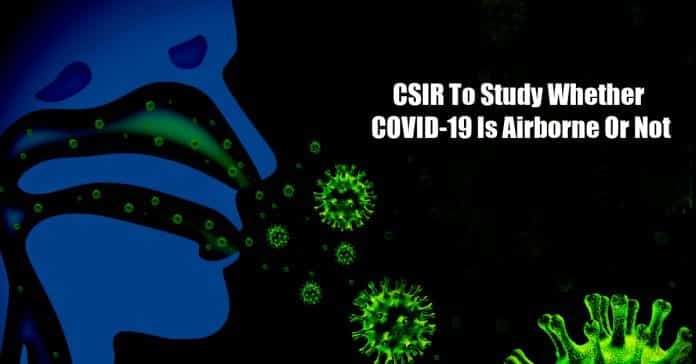Is COVID19 airborne? CSIR to carry research study to ascertain it
The entire scientific community has actually begun looking at the mode of transmission of unique coronavirus with a different perspective, after the World Health Organisation’s recent acknowledgment that there is emerging proof of the airborne spread of the novel coronavirus. Dr. Shekhar C Mande, Director-General, Council of Scientific and Industrial Research (DG-CSIR) said that airborne transmission of COVID19 is possible, put on masks in enclosed rooms as well. Is COVID19 actually transmitting through the air? To address this concern 2 labs under the CSIR – Institute of Microbial Technology (IMTECH), Chandigarh, as well as Centre for Cellular and Molecular Biology (CCMB), Hyderabad, are getting ready to carry out research.
Droplets are sprayed from our mouth when we sneeze, cough, talk, or sing. The larger droplets, drop to the ground like a ball thrown from a height and settle the surfaces. If the individual from where the droplets had spread is an infected person, then virus transmission can happen by inhalation of the droplets or touching the droplets on the surface.
Smaller sized droplets remain suspended in the air for a longer time, like a feather that remains much longer
in air, and lifted up by air currents. There is a potential risk of disease spread via these small droplets if individuals at crowded places come in contact with these droplets.The virus-laden droplets are unlikely in a public road or an open park. But, an infected person can leave a trail of little droplets with viruses suspended in the air in enclosed areas.
What are the possible places?
In the first place, one needs to do study by taking the air sample. Dr. Sanjeev Khosla, Director, IMTECH, Chandigarh said that they are in talks with the state governments to permit them to go to some of the areas where there is a possibility of viruses like public transports, isolation centers or hospital ICUs.
Specialized machines with a suction pump that draws air are used for air sampling. The sampled air goes through a filter at the end of the machine. Airborne microbes are trapped by the filter. Dr. Khosla said that they will be taking air samples from a particular area and then try to see whether these air droplets have the virus and how far we can detect the viruses. The filters, as well as the suction pump, are cleaned up after every collection to make sure that the machine does not get contaminated. The machines are being made use to trap various other micro-organisms also and are patented devices.
The machine would certainly evaluate for the presence of various microorganisms including novel coronavirus as soon as the sampling is done. Dr. Khosla said, as one has to repeat the experiments as contamination needs to be taken care of, the sampling process may take time.
Author: Sruthi S






























